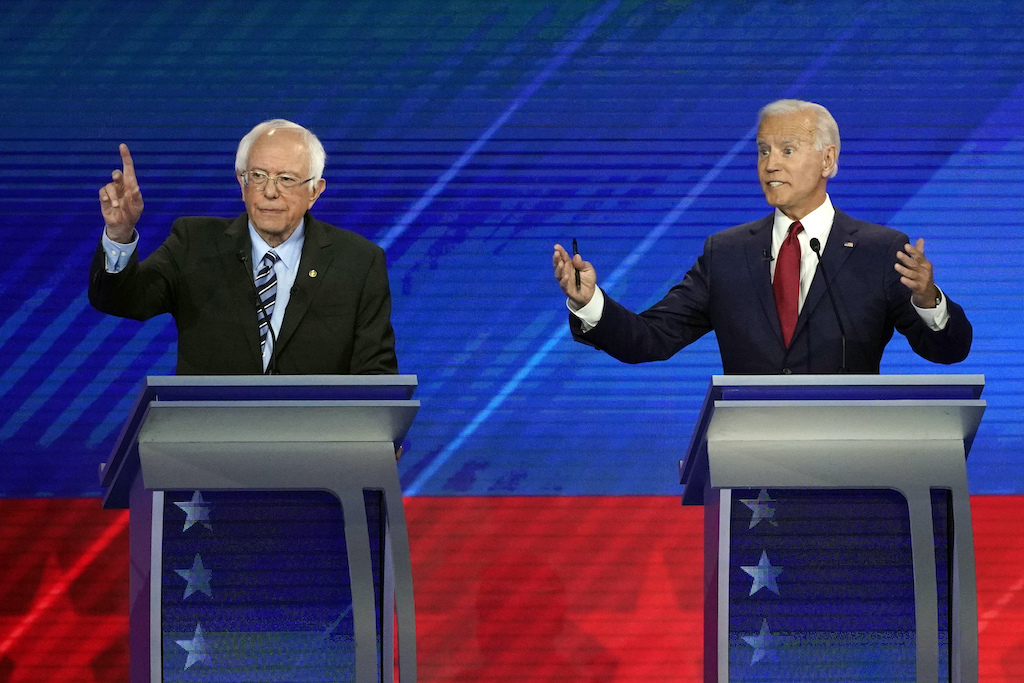Corporate influence of the Democratic debates is pervasive, nauseating and bad for the working class.
The corporate media companies—NBC, ABC, CNN and CBS—hosting the debates are not focused on educating the public or hosting meaningful debate. They’re in the entertainment business, and creating a high-stakes, WWE-style environment dumbs down political discourse enough for the average viewer to gain some entertainment value to the detriment of the substance of the debate.
The debates have been a complete shit show akin to political theatre, in which the goal is not to articulate a clear argument or have a genuine policy discussion; rather the candidates on stage regurgitate rehearsed lines and dunk on opponents for that prized sound bite.
This is not a phenomenon of the candidate’s creation. The Democratic National Committee has allowed 10 or more candidates to be on one stage, leading to shorter amounts of talking time and an urgency to make a splash when a candidate is asked to respond. There is no engaging in a long-form discussion of important issues when you only have a little over a minute or less to respond, so candidates rightly view the debates as a publicity stunt for their campaigns and for some, their careers.
The total speaking time for candidates is nonsensical. In the last debate, Independent Senator of Vermont Bernie Sanders, who is a top-tier candidate, received similar speaking time as Montana Senator Amy Klobuchar and former-Congressman Beto O’Rourke, both of whom are polling at 2%. Also, tech entrepreneur Andrew Yang received less speaking time—just over 9 minutes—than the majority of the field, even though he is polling higher than half of the candidates, including Klobuchar and O’Rourke.
The corporate influence of the debate runs deeper though. The framing of the questions and the time spent on specific issues has been mind-boggling and biased in favor of established powers. For instance, in the last two debates, moderators asked only one question related to the climate crisis, which, according to a report from the United Nations’ Intergovernmental Panel on Climate Change, we only have until 2030 to cut carbon emissions in half and avoid a climate catastrophe. A plurality of Democratic primary voters said climate change is one of their top three issues, and 56% said climate change was not discussed enough in the October debate, according to a post-debate Morning Consult poll.
Allotting just one question on climate change does not fall in line with the values of the Democratic base; instead, corporate media continues asking candidates about Donald Trump and the Republicans, as if there isn’t hours of footage showing where each candidate stands on that issue. Democratic voters know Trump is a ghoul, and the Republican Party—which has an 8% favorability rating among Democrats—is morally bankrupt.
Corporate media is woefully out of step with the Democratic base, and it is also reflected in the worldview that oozes from the framing of their questions. Although nearly 70% of all voters support single-payer health care—also known as Sanders’ Medicare for All plan—they repeatedly ask Sanders and Massachusetts Senator Elizabeth Warren how they intend to pay for the robust program, and if “middle class taxes” will increase.
However, the corporate media’s question is entirely devoid of context as they purposefully leave out that our for-profit, health care system costs $3.5 trillion every single year, twice as much as any other developed country and still leaves 27.5 million without health coverage. In contrast, multiple studies have placed the cost of “Medicare for All” between $3 and 3.3 trillion, which would save trillions in overall healthcare costs over the next decade and cover every single person in the U.S.
Furthermore, if anchors like Anderson Cooper and company are really concerned about federal spending, they should ask candidates like New Jersey Senator Cory Booker and Klobuchar why they voted in 2018 for an $80 billion increase in the already bloated—$717 billion per year—military budget.
They won’t, because their priorities don’t lie with the well-being of the American tax payer, not to mention the millions of dollars they make selling ad time to health insurance companies during the debate; they understand a single-player system would require a radical redistribution of resources including strong, progressive income and wealth taxes and that doesn’t bode well for the upper and professional classes, of which corporate media and their personalities belong to. In order to reduce costs for the average person, taxes on the rich need to increase, and this is the dichotomy at play in the debates.
Even at the end of the October debate, rather than asking a question about the nearly $1.6 trillion of student debt, $81 billion of medical debt or the impending climate crisis, they spent the final moments invoking Ellen DeGeneres’ friendship with war criminal former President George W. Bush.
God help us all.







This was a great article, ty. I really wish Yang and Bernie would demand a little more time on the stage, they could definitely benefit from getting a little sassy.